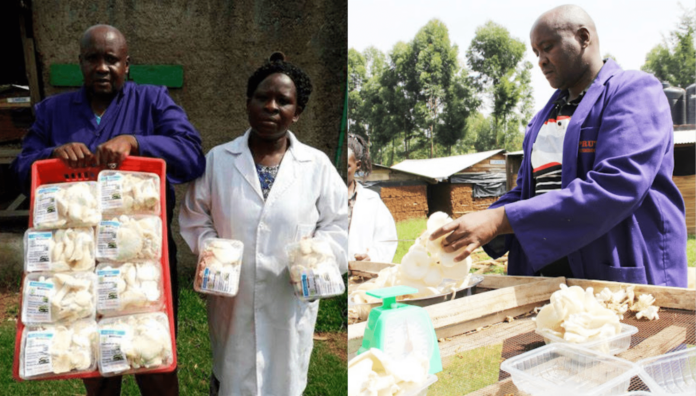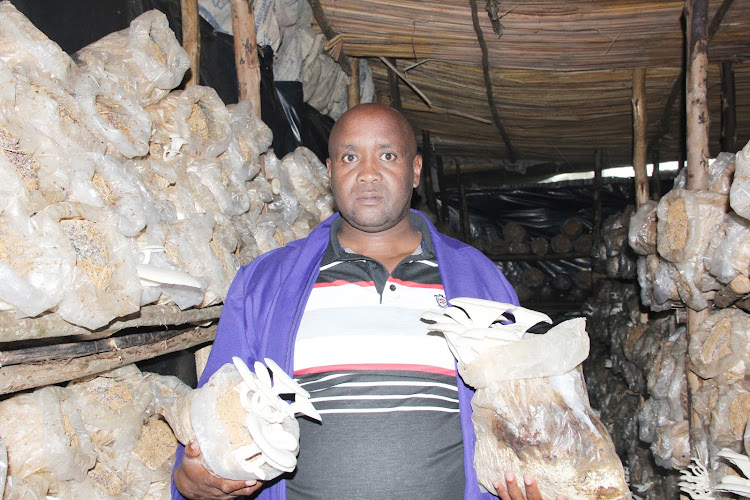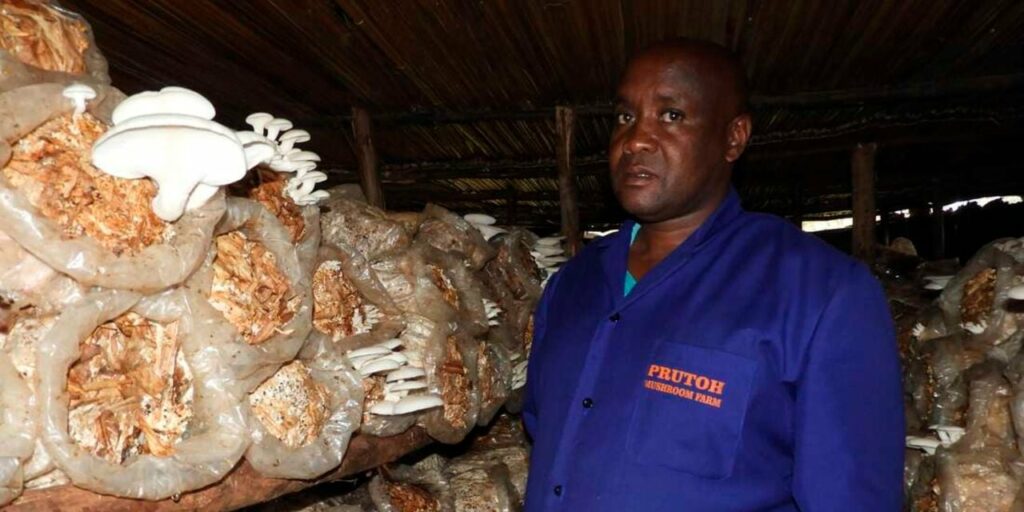Limitless opportunities have presented themselves in the modern-day era we live in. With the simple click of a button, the internet has revolutionized how we get empowered with vast information.
Many have chosen to harness this potential and make fortunes out of it. A good example is former banker Paul Ruto. He is now a successful mushroom farmer thanks to the internet.
Five years ago, the resigned banker was crestfallen after his dairy and passion business was unfruitful. This was after he had taken a loan of Sh. 300,000 and employed a farmhand to take care of the crops and animals.
“The business collapsed due to poor management. I trusted the farmhand, but I came to realise he did not know much on managing the cows and fruits leading to diseases,” Ruto stated.
It was an investment that had not paid off, certainly. Head-up, Ruto decided to conduct extensive research on a crop he could grow as a telephone farmer. Mushrooms!
“After reading about mushroom farming on Facebook, my friends and I formed a WhatsApp group on mushroom farming and learnt more about the changing technologies and advised one another,” he recalled.
“What interested me is that the crop could be commercialized under a very small space.”
Paul Ruto is a Bachelor of Science graduate with a degree in Wood Science from Moi University. He also holds an MBA in social entrepreneurship from Tangaza College.
Ruto resigned from his bank job in 2017 to pursue his interests in mushroom farming. He underwent Mushroom farming training at the University of Eldoret and conducted field studies too in various counties.
“I visited farmers in Kakamega, Nyanza and North Rift regions for lessons,” he stated, adding that he paid Sh. 3,000 to learn about mushroom farming in Kakamega County.
Armed with the knowledge and blind hope that this venture would succeed under his leadership, Ruto launched his Mushroom farm in August 2017.
Setting up the farmhouse was rather inexpensive as he already had a dairy farmhouse from his failed venture. All it required was materials such as banana leaf waste, wheat straw, sawdust and sugar waste from factories.
With a set development cost of Sh. 50,000, he constructed shelves that could hold 140 bags. He then purchased mushroom seeds (spawns) and propagated them. Paul Ruto grows the button variety.
A month later, he made his first harvest and sales in Sotik, Kaplong, Litein and Bomet towns. From this, he earned Sh. 41,000.
“I started with one house but with only the first harvest, the demand was overwhelming and I went for a soft loan to build two more mushroom houses to enable me to sustain my clients,” he noted in a past interview.
In his second season, Paul Ruto planted 400 bags and expanded his structures to get more harvest.
“To start mushroom farming, one is required to have two houses for the harvest to be continuous as after planting, one is required to harvest after 45 days and replant after three months,” Ruto advised.
John Kiehia: Uthiru Man Making Sh160k Weekly From Mushrooms Farming
The exponential growth in demand for mushrooms and mushroom products saw the farmer construct 8 mushroom houses. Even with these expansions, the market spreads across Kericho, Nyamira, Kisii, Narok and Bomet.
“I maintain that technology is wonderful since I don’t have to travel much to market my products. I use digital platforms to reach the market and use the same to get my money,” he says.
Ruto manages his farm alongside his wife, Nancy. Together they have employed five workers; two salespersons and three farmhands.
“I now make up to four times more than my initial profit. It is a gamble that eventually paid off.”
Paul Ruto, an esteemed member of the Mushroom Growers Association, sources his seeds from the Kenya Industrial Research and Development Institute or Museums of Kenya.
Ruto states that a variety of edible mushrooms are available in the market. The Oyster and Button varieties are the most preferred among Kenyan farmers due to their high demand for nutritional value.
“The other varieties like Shiitake, Portobello, Gardama and Maitake mushrooms are rare in the market and sometimes are imported by supermarkets and hotels as they have special customers,” the farmer noted.
Ruto, who is in his late 30s, advised young people to venture into mushroom farming. He, however, cautioned that mushroom seedlings could be very expensive as they are scientifically processed in laboratories for the spores to be cultured in sorghum.
“I challenge the youth to stop using the internet to look for inappropriate pictures and videos but as a means to change their lives.”











